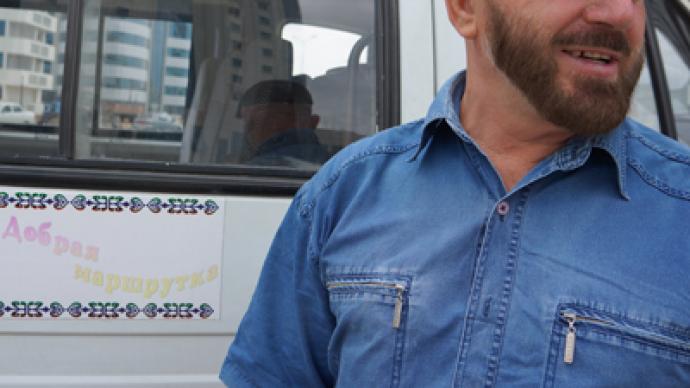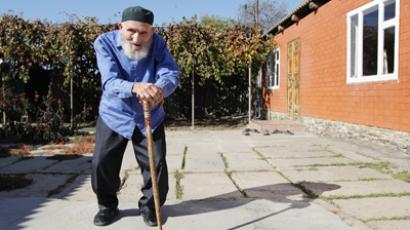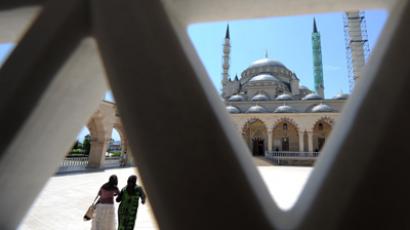'The first people of freedom': Courageous share taxi driver recalls life in Chechen warzone

Musa is one of Grozny's many share taxi drivers, but he’s also a local celebrity for giving free rides to those in need. It's all part of his daily routine, which saw him saving dozens of lives during the Chechen conflict.
I am meeting Musa in the lobby of a gorgeous hotel in Grozny, where nightly rates are higher than a teacher’s monthly income. I see him park the old minibus he operates as a share taxi right next to a brand new Maybach that delivered an overseas VIP guest. I heard of Musa totally by accident. I had just come across an ad published on the Internet saying this particular share taxi gives free rides to all seniors, children, handicapped individuals, people who have no money or accidentally left their purse at home, people riding to attend a funeral or to visit a hospital and those who have completed the Hajj. I asked around to find this share taxi’s driver to write a story about him. When I found him, he wasn’t willing to give an interview, but his story had already gone viral on the Internet and eventually reached Ramzan Kadyrov, the head of Russia’s southern Republic of Chechnya. He rewarded Musa with the opportunity to undertake the Hajj pilgrimage. So, my first question to Musa was: “Have you got your travel passport and visa yet?” I was curious, as it often happens that people get gifts they cannot actually use, and it is not easy for Chechen residents to get travel passports for trips abroad. Musa submitted all the paperwork to the authorities, and he's not speculating whether or not his passport will be ready in time, although he’s been dreaming of undertaking the Hajj for 20 years.“My first attempt at the Hajj was back in 1993,” he says. “The travel agency just didn’t get the timing right, the borders were already being shut down at the time.” Musa hasn’t always been a share taxi driver. He spent 17 years of his life in Russia’s Penza Region, where he had a career building railways. Penza is also where he married a Chechen national and raised two of his sons. As the Soviet Union collapsed, Musa returned to Chechnya.
'Pushed to the frontline'
When general Dzhokhar Dudayev was in power, Musa was the head of the rescue force. He traveled to Moscow where he arranged to open in Grozny the country's only – both then and now – environmental crime protection agency. He stayed in Grozny through both anti-militant campaigns. “I never left – I had my both parents here, both quite old,” Musa explains. His younger son still has a bullet under his eye from a shooting during the violence: “It kicked his eye out, they were able to put it back, but the vision was lost. It was a miracle – my son took a mere four days to recover from the wound; the bullet just found a cavity where it sits till today.” Musa tells me this story as if it were something perfectly ordinary, and no reason for drama. The school his sons attended was one of the first to be destroyed. But one of its teachers, a Russian national named Natella Olegovna, refused to leave. She teamed up with Musa to find one of the few standing buildings in Grozny, and relocated all the school furniture they could find to there.“And Natella Olegovna started up the school program again, while I was elected to be chairman of the republican parent council. We have a saying, 'a fool gets pushed to the frontline,'” Musa says. He eventually started driving people around during the second war campaign, and each of those trips could have been lethal: “I made trips every day. Bombings occurred pretty often. Once they stopped me at a checkpoint and searched the entire vehicle, took off panels. Then they said, your engine number belongs to a car reported stolen, and quoted the issue date of that engine, but my car was nearly twice as old. So, I got away that time.”“Share taxi drivers were the very first people of freedom – at a time of no order, no governmental control. We, drivers, got warning fire coming at us, but we would stop the car, step out and walk to the check point to negotiate. We were the first to know that traffic police was now in control. I remember that Dudayev’s traffic police patrols were the first to appear on all roads, and it was their rule, the rule of the traffic police. There was no other,” Musa says. Share taxi drivers became the liaison between groups of society that previously looked at each other only down the barrel of their guns.“I knew all field commanders, I met many in person. Thanks to that, we have rescued 270 people.” Musa is quite unwilling to talk of what is, by all standards, an heroic feat. From his point of view, the past belongs in the past, and he would rather focus on overcoming the hardships of war than the hardships themselves.“My father was an outstanding person. When chaos set in, he volunteered to act as the elder in our village. All refugees found shelter at our home. He also ran negotiations with the check point staff trying to have the arrested people released, and he would say that the military would honor his requests – not for money, but because he had vouched for them.”“They even mentioned our house as 'the mullah’s house' in the wires, when the OMON (Special Purposes Mobile Unit) friendly fire incident occurred. There were no militants involved but the new agencies issued wires saying the fire came from our house…” Musa recalls. His family could have just as easily been eliminated, except for a sheer miracle. Musa has had quite a generous share of such miracles in his life. He once met Anna Politkovskaya in person at a local share taxi park in 2001. He said hello, and went on his way. People in Chechnya revere this woman as no one else, except perhaps teachers.
Second campaign
“For 10 years, there was no payroll for teachers in Chechnya – we had to buy them food. Teachers in Chechnya are saints,” Musa says. In 1999, he succeeded in contacting Russian Prime Minister Sergey Stepashin, who promised to allocate 27 million rubles to teachers in Chechnya. Stepashin signed the order, but the money wasn’t coming in. Musa undertook another trip to Moscow and got through to the ministers of education and finance, only to find out that the money was never wired to Chechnya. No one could give him an explanation where the funds were. Three months later, the Second Chechen Campaign broke out. In 2001 and 2002, with war well underway, Musa organized a teachers’ trade union: “We got arrested, detained, they were nearly charging us with assisting terrorists,” yet it all worked out this time too.“I’ve made it my mission to remain a Chechen no matter what. We, the Chechens, have never been afraid to tell the truth – it keeps your spirit pure. It is my right. I am willing to give up some comfort, but I want to be independent. Telling the truth is the virtue of the Chechens.” As Musa speaks, seems to be talking to himself rather than a person in front of him, a habit of the highlanders from this area. I ask him why he made his pledge to give people free rides. “Because that’s how it should be. And it’s just a small part of how it all should be. Our ancestors praised abstinence and altruism, they never indulged in luxury – either in clothes or in food. It’s a shame to have your doors closed to visitors. That’s what you need a big house for – for your guests, for weddings or funerals, not for showing off. Everyone can do things for himself, but it doesn’t make you a man,” Musa says. He thinks that good deeds should be performed to please Allah, not for fame or notoreity. For example, he refused to raise his taxi fee when everybody else did. He thought the money he made was enough, and didn't need any more. One of his friends counted how much money Musa lost because of his charity project, and told him that he could have bought a new vehicle by now.“But I don’t need a new vehicle, while people do need to go places, and many of them don’t have the money,” Musa explains. He is no eccentric – he’s a strong man, who knows war firsthand, not from stories or computer games. Musa agreed to talk to a reporter only after he was convinced that what he was doing touched people’s hearts. “And you, reporters, send the message to the people, right?” he asks. He has been performing altruistic deeds like these since childhood. No one ordered him to, he just felt like it. Once, as a young boy, he saw a group of seniors standing at a bus stop. He made a bench and secretly installed it at the bus stop. He never uttered a word about it to a single soul – and then he heard the seniors’ words of gratitude to the unknown “good carpenter.” After that, he built a bridge over a local spring, and also heard people praise the “unknown builder.”“Everything you do for Allah makes you happy,” Musa says. I walk him to his taxi van – it’s time for Musa to go pick up the people he had earlier taken to the seaside, and it’s a few hours’ drive away.“You know, when I was a little boy, there were only two mosques in Chechnya and no one below the age of 60 ever attended then. Now, I took a group of young men to the seaside and the very first thing they did was unroll their mats and pray,” he says. Musa steers his van out of the parking lot full of expensive cars and waves goodbye with a smile so peaceful, it's as if there had never been a war on this soil.
Nadezhda Kevorkova, RT














